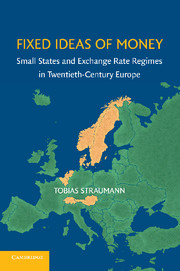Conclusion
Published online by Cambridge University Press: 06 July 2010
Summary
This study has attempted to answer the question of when, how, and why seven small and developed European states changed their exchange-rate regime during the twentieth century. The main results are as follows:
1. Basically, small European states made the same choices as large European states. They adopted the gold exchange standard during the interwar years, joined the Bretton Woods system, and later either introduced the euro or a floating-exchange-rate regime. Today, Austria and the Benelux countries have the euro – like France, Germany, and Italy – and Norway, Sweden, and Switzerland have a floating exchange rate – like the United Kingdom. Denmark has a fixed exchange rate against the euro.
2. However, despite sharing a common trend, small and large states pursued different paths during the interwar period and after Bretton Woods. During the interwar period, country size determined the timing of regime changes, that is, when countries adopted the gold exchange standard and when they abandoned it. In general, small states closely followed large states. After Bretton Woods, country size was relevant in two respects. First, small European states showed a stronger preference for fixed exchange rates than large European states (France, Germany, Italy, and the United Kingdom). The main reason was that in contrast with academic economists, small-state policymakers were convinced that it would be impossible to control inflation and have normal trade relations if their small, open economies were exposed to the highly volatile foreign-exchange markets.
- Type
- Chapter
- Information
- Fixed Ideas of MoneySmall States and Exchange Rate Regimes in Twentieth-Century Europe, pp. 343 - 346Publisher: Cambridge University PressPrint publication year: 2010



